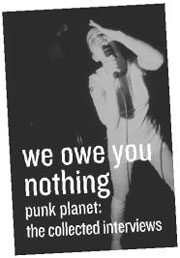One of my favorite things in Julien Temple’s Sex Pistols documentary The Filth and the Fury is the footage of the earliest days of punk rock in London. Looking at the grainy images of patrons at revered venues like the 100 Club, I was struck by the diversity of dress—trash-bag mini-dresses, cast-off costumes from sci-fi B movies—and the notable absence of menace associated with the era. Punk’s infancy seemed no more sinister than a drama club party. In the beginning, leather jackets, spiked hair, ripped T-shirts, and combat boots were hardly de rigueur. It was only after the media began splashing “punk” all over the tabloids that looks and behavior started becoming codified, Temple’s subjects stressed.
In high school, my friends and I shared that anything-goes mind-set. Although everyone else in school referred to us as “punks,” we rejected the term. We knew hardcore punks, dropouts who sculpted their mohawks with Elmer’s glue, and that wasn’t us. Yeah, we listened to Siouxsie and the Banshees and lied about studying at the library to go see X, but we also liked Arlo Guthrie. We showed up for first period in lab coats and thrift-store scarves worn pirate-style, not bondage pants. So we insisted we were new wave, or “art trash,” or simply balked at the name game: “I’m an individual, you can’t put a label on me.” Anything but punk.
The term still makes me uneasy. There are bands that I love that fit in that niche—the Explosion, the Alkaline Trio—and I’m more likely to listen to an unknown record issued by Epitaph or Lookout! before I waste valuable time on the latest Warner Bros. crap. I just have trouble getting my head around that word. Which is why I had never read Punk Planet—I incorrectly imagined that, like Maximum Rock n Roll, this fanzine was concerned with drawing neat little lines around what was and wasn’t punk, and defending its territory from interlopers. Boy, was I wrong.
I realized my error almost immediately upon cracking open We Owe You Nothing: Punk Planet: The Collected Interviews (Akashic Books). Yes, names like Jello Biafra number among the 25 interviewees listed on the back cover. But so do sonic collage artists Negativland, poster artist Frank Kozik, and Voices in the Wilderness, a group of volunteers who defy the embargo against Iraq to bring medicine and supplies to people in need.
All the interviews in We Owe You Nothing are presented in Q&A format, the same way Punk Planet has printed them since its inception in 1994. In his introduction, editor Daniel Sinker says he feels it’s a more honest approach. “The ‘featurized’ interview format favored in establishment rock rags usually lets you know a lot more about who’s doing the writing than who the writing is about,” he observes. Personally, I’m very suspicious of folks who favor Q&A interviews (“That’s not writing, that’s transcribing!”). Yet the people conducting the interviews in Punk Planet are clearly passionate about their subjects and have done their homework, and consequently, as Sinker notes, “the words we’ve transcribed have been fascinating.”
We Owe You Nothing is divided into six sections. The big names are up front, collected in “Partners in Crime: Punk’s Trailblazers” and “The Spotlight of the Sun: Dealing with Success.” While these chunks are excellent (I particularly enjoyed contrasting the oral history of Black Flag, which includes interviews with all the band members from various incarnations, with Henry Rollins’ Get in the Van), the most compelling material comes later, in “Away from the Numbers: Breaking the Mold” and “In Her Kiss, I Taste the Revolution: Punk & Politics.” If the essence of punk is asking why—”Why don’t we have an all- ages club?” “Why doesn’t this band have a record out?”—and then forging your own answers, banding with other women to improve access to safe, legal abortion (ࠬa the Central Ohio Abortion Access Fund) is a hell of a lot more punk than buying an Offspring CD.
Sinker’s anthology did what I expect any good music-related book to do; I wanted to hear what the fuss is about, to race down to Fallout and buy up everything by Latino hardcore band Los Crudos. But it did much more, too. It compelled me to read Noam Chomsky, and throw myself into my community volunteer work even harder, and explore new ways to raise my voice against a government that doesn’t represent my needs and concerns. We Owe You Nothing made me feel vital and alive. And while I’m still uncomfortable about that word, this book made me realize that the revolutionary spirit that throbs in my breast—and has since I was a teen—is a hell of a lot more “punk” than piercing my lip and begging for change on Broadway in a filthy Dead Kennedys T-shirt.*






